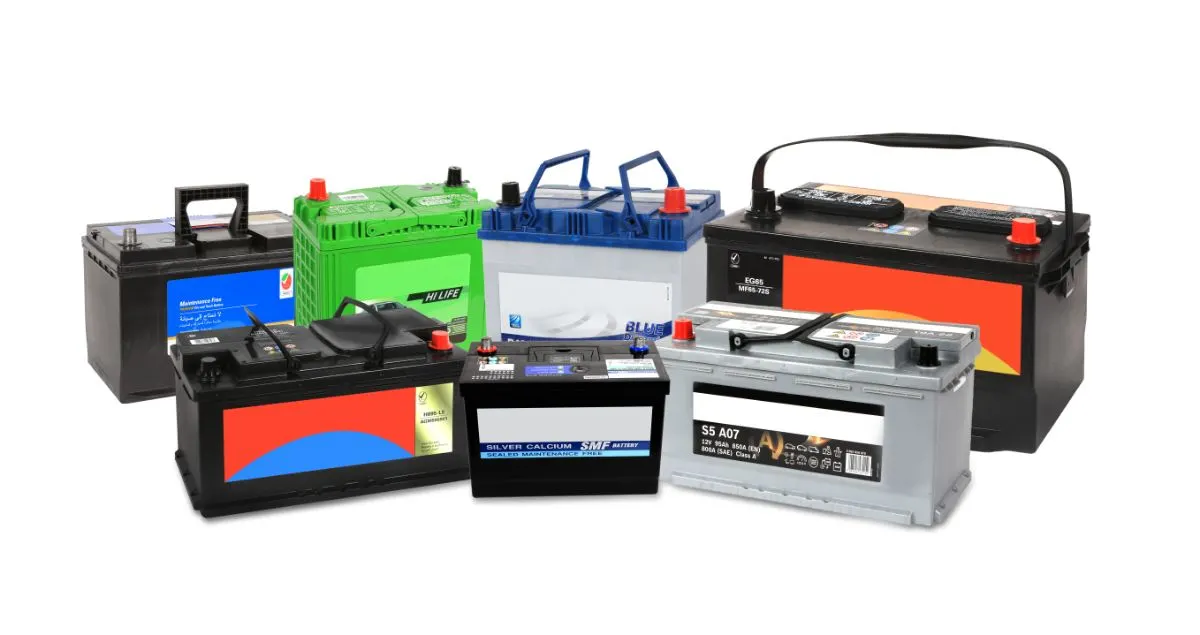In today’s fast-paced world, having a reliable power source is more important than ever. Multipurpose batteries have emerged as a versatile and indispensable solution for a wide range of applications. Whether you’re powering household gadgets, portable devices, or industrial equipment, these batteries offer a convenient and efficient way to keep your devices running smoothly. Their ability to cater to diverse needs while maintaining high performance makes them an essential component in our daily lives. In this article, we’ll delve into the various types of multipurpose batteries, their benefits, and why you should consider them for your power needs.

What Are Multipurpose Batteries?
Multipurpose batteries, as the name suggests, are designed to power a variety of devices and applications. Unlike specialized batteries that are tailored for specific uses, multipurpose batteries offer broad compatibility and flexibility. They come in various sizes and chemistries, making them suitable for everything from small electronics to larger industrial machines. This versatility means that a single type of battery can often be used across multiple devices, simplifying the process of managing and replacing batteries.
The broad range of applications for multipurpose batteries includes everyday household items, medical devices, and even emergency preparedness kits. Their widespread availability and ease of use make them a preferred choice for consumers and businesses alike. Whether you need a quick power solution for your flashlight or a reliable backup for your industrial tools, multipurpose batteries are up to the task.
Common Types of Multipurpose Batteries
There are several types of multipurpose batteries available on the market, each with its own set of characteristics and advantages. Understanding these differences can help you choose the best battery for your specific needs. Here are some of the most common types:
Alkaline Batteries
Alkaline batteries are perhaps the most well-known type of multipurpose battery. They are commonly used in household items such as remote controls, flashlights, and toys. Alkaline batteries are known for their long shelf life and reliable performance. They are also relatively inexpensive, making them a popular choice for everyday use.
In addition to their affordability, alkaline batteries are widely available and come in various sizes to fit different devices. Their long shelf life means you can store them for extended periods without worrying about losing power. However, they are not rechargeable, so they need to be replaced once depleted.
Lithium Batteries
Lithium batteries are another popular choice for multipurpose applications. They offer a higher energy density compared to alkaline batteries, making them ideal for high-drain devices such as digital cameras and portable electronics. Lithium batteries are also lightweight and have a longer lifespan. This makes them particularly useful for devices that require a lot of power in a compact form.
Lithium batteries can function efficiently in extreme temperatures, making them suitable for outdoor equipment and industrial use. Despite their higher upfront cost, their longevity and performance often make them more cost-effective in the long run. However, it is essential to handle them with care, as they can be more sensitive to physical damage and improper usage.
Nickel-Metal Hydride (NiMH) Batteries
NiMH batteries are rechargeable and are often used in devices that require frequent battery replacements, such as cordless phones and power tools. They offer a good balance between capacity and rechargeability, making them a cost-effective and eco-friendly option. NiMH batteries are also known for their ability to deliver a consistent power output over their lifespan.
One significant advantage of NiMH batteries is their reduced environmental impact compared to disposable batteries. By opting for rechargeable options, you can minimize waste and contribute to sustainability efforts. However, they do have a lower energy density than lithium batteries, so they may not be suitable for all high-drain applications.
Nickel-Cadmium (NiCd) Batteries
NiCd batteries are another type of rechargeable battery. They are known for their durability and ability to perform well in extreme temperatures. However, they have a lower energy density compared to NiMH batteries and are less commonly used today due to environmental concerns. NiCd batteries also suffer from the “memory effect,” which can reduce their capacity over time if not properly maintained.
Despite these drawbacks, NiCd batteries are still used in specific applications where their ruggedness and reliability are crucial. They can handle a high number of charge and discharge cycles, making them suitable for tools and equipment that see frequent use. Proper disposal and recycling are essential to mitigate their environmental impact.
Benefits of Multipurpose Batteries
Multipurpose batteries offer several advantages that make them a popular choice for a wide range of applications. Understanding these benefits can help you make an informed decision when selecting batteries for your needs. Here are some of the key benefits:
Versatility
One of the main advantages of multipurpose batteries is their versatility. They can be used in a variety of devices, from small household gadgets to larger industrial equipment. This makes them a convenient and flexible power solution. The ability to use the same type of battery across different devices can simplify your inventory and reduce the hassle of managing multiple battery types.
Additionally, their broad compatibility means you can easily find replacements in most stores, whether you need a quick fix for your TV remote or a power source for your cordless drill. This versatility also extends to their performance, as many multipurpose batteries are designed to function efficiently in different environments and conditions.
Cost-Effectiveness
Multipurpose batteries are often more cost-effective than specialized batteries. Because they can be used in a wide range of devices, you don’t need to buy different types of batteries for different applications. This can save you money in the long run. Moreover, the availability of rechargeable options like NiMH batteries can further reduce costs by eliminating the need for frequent replacements.
By investing in high-quality multipurpose batteries, you can ensure a reliable power source for your devices while minimizing long-term expenses. Bulk purchasing and taking advantage of sales or discounts can also enhance cost savings. Ultimately, the cost-effectiveness of multipurpose batteries makes them a smart choice for both personal and professional use.
Availability
Multipurpose batteries are widely available and can be found in most stores that sell batteries. This makes them easy to replace when needed, ensuring that your devices are always powered and ready to use. Whether you prefer shopping online or visiting a physical store, finding the right multipurpose battery is usually a straightforward process.
Their widespread availability also means you can easily stock up on batteries and have them on hand when needed. This is particularly useful for emergency preparedness, ensuring that you have a reliable power source during unexpected situations. The ease of access to multipurpose batteries adds to their appeal and convenience.
Environmental Benefits
Many multipurpose batteries, especially rechargeable ones, are more environmentally friendly than disposable batteries. By using rechargeable batteries, you can reduce the number of batteries that end up in landfills, helping to protect the environment. This is a significant consideration for those looking to minimize their ecological footprint.
Rechargeable batteries like NiMH and NiCd can be used multiple times, reducing waste and conserving resources. Proper disposal and recycling of batteries also contribute to environmental sustainability. By choosing eco-friendly battery options, you can enjoy reliable power while supporting efforts to protect the planet.
Applications of Multipurpose Batteries
Multipurpose batteries are used in a wide range of applications, from everyday household items to industrial equipment. Their versatility and reliability make them suitable for various purposes. Here are some common uses:
Household Gadgets
Multipurpose batteries are commonly used in household gadgets such as remote controls, flashlights, and clocks. Their versatility makes them a convenient choice for powering these everyday items. The ability to quickly replace batteries ensures that your household devices remain functional at all times.
In addition to remote controls and flashlights, multipurpose batteries are also used in smoke detectors, wall clocks, and children’s toys. Their reliability and ease of use make them an essential component in maintaining the smooth operation of household gadgets. Whether it’s for daily use or emergency situations, having a stock of multipurpose batteries can be highly beneficial.
Portable Electronics
Many portable electronics, such as digital cameras, MP3 players, and handheld gaming devices, rely on multipurpose batteries for power. Lithium batteries, in particular, are a popular choice for these high-drain devices due to their high energy density and long lifespan. This ensures that your portable devices can operate efficiently without frequent battery changes.
In addition to digital cameras and MP3 players, multipurpose batteries are also used in portable speakers, e-readers, and fitness trackers. Their lightweight and compact design make them ideal for portable devices that require reliable power. With advancements in battery technology, multipurpose batteries continue to support the growing demands of modern portable electronics.
Medical Devices
Multipurpose batteries are also used in a variety of medical devices, including hearing aids, blood glucose meters, and portable oxygen concentrators. Their reliability and long shelf life make them a suitable choice for these critical applications. Ensuring that medical devices have a dependable power source is crucial for the well-being of patients.
In addition to hearing aids and blood glucose meters, multipurpose batteries are also used in thermometers, blood pressure monitors, and portable defibrillators. The consistent performance and long-lasting power of these batteries are essential for the proper functioning of medical devices. By choosing high-quality multipurpose batteries, healthcare providers can ensure the safety and effectiveness of their equipment.
Industrial Equipment
In industrial settings, multipurpose batteries are used to power a range of equipment, from hand tools to backup power systems. Their durability and ability to perform well in extreme conditions make them a reliable choice for these demanding applications. Industrial environments often require batteries that can withstand harsh conditions and provide consistent power.
Multipurpose batteries are also used in construction tools, machinery, and emergency lighting systems. Their robustness and reliability ensure that industrial operations can continue smoothly without interruptions. By investing in high-quality multipurpose batteries, businesses can enhance the efficiency and productivity of their industrial equipment.
Emergency Preparedness
Multipurpose batteries are an essential component of any emergency preparedness kit. They can be used to power flashlights, radios, and other emergency equipment, ensuring that you have a reliable source of power in case of a power outage or other emergency. Preparing for emergencies requires having dependable batteries on hand.
In addition to flashlights and radios, multipurpose batteries are also used in emergency lanterns, portable chargers, and medical devices. Their long shelf life and reliable performance make them a crucial part of any emergency plan. By including multipurpose batteries in your emergency kit, you can be better prepared for unexpected situations and ensure the safety and well-being of your family.
Tips for Choosing and Using Multipurpose Batteries
When selecting multipurpose batteries for your devices, there are several factors to consider to ensure you get the best performance and value. Here are some tips:
Check Compatibility
Before purchasing multipurpose batteries, make sure they are compatible with your devices. Check the device’s manual or packaging for battery specifications and choose batteries that match those requirements. Using the wrong type
of battery can lead to poor performance or even damage to your devices. Additionally, consider the battery’s size, voltage, and chemistry to ensure optimal functionality. It’s also wise to invest in reputable brands known for their quality and reliability, as this can significantly impact the longevity and efficiency of the batteries. By taking the time to verify compatibility and quality, you can enhance the performance of your devices and avoid unnecessary replacements or malfunctions.
Store Batteries Properly
Proper storage of multipurpose batteries is essential to maintain their performance and longevity. Keep batteries in a cool, dry place away from direct sunlight and extreme temperatures, as these conditions can cause them to degrade faster. It’s also important to store batteries in their original packaging or in a battery organizer to prevent them from coming into contact with metal objects, which can lead to short-circuiting. Additionally, regularly check the expiration dates on batteries and rotate your stock, using older batteries first to ensure that you always have reliable power when you need it. By following these storage tips, you can maximize the lifespan and effectiveness of your multipurpose batteries.
Dispose of Batteries Responsibly
When it comes to disposing of multipurpose batteries, it’s crucial to follow proper guidelines to minimize environmental impact. Many batteries contain hazardous materials that can be harmful if not disposed of correctly. Always check local regulations regarding battery disposal, as many communities offer recycling programs specifically for batteries. Some retailers also provide drop-off locations for used batteries, making it easier to recycle them responsibly. By taking the time to dispose of batteries properly, you not only protect the environment but also contribute to the sustainable management of resources. Educating yourself and others about responsible battery disposal can help foster a culture of environmental awareness and responsibility.
Consider Battery Life and Performance
When selecting multipurpose batteries, it’s essential to consider their expected lifespan and performance characteristics. Different battery types have varying discharge rates and capacities, which can significantly affect how long they will power your devices. For instance, lithium batteries typically offer longer usage times and better performance in high-drain applications compared to alkaline batteries. Additionally, look for batteries that provide consistent voltage output throughout their lifespan, as this can ensure your devices operate efficiently without unexpected shutdowns. By understanding the performance metrics of different battery types, you can make informed choices that align with your power needs and enhance the overall functionality of your devices.
Keep an Eye on Battery Health
Monitoring the health of your multipurpose batteries is crucial for ensuring optimal performance and longevity. Regularly check for any signs of corrosion, leakage, or swelling, as these can indicate that a battery is nearing the end of its life or has been damaged. If you notice any of these issues, it’s best to dispose of the battery immediately to prevent potential harm to your devices or safety hazards. Additionally, consider using a battery tester to assess the charge level of your batteries, especially for rechargeable types. By staying vigilant about battery health, you can avoid unexpected power failures and ensure that your devices remain functional when you need them most.
Conclusion
In conclusion, multipurpose batteries are an essential part of our daily lives, providing reliable power for a wide array of devices and applications. Their versatility, cost-effectiveness, and environmental benefits make them a smart choice for consumers and businesses alike. By understanding the different types of multipurpose batteries available, their specific applications, and how to choose and use them effectively, you can ensure that your devices remain powered and functional. As technology continues to evolve, the demand for efficient and sustainable power solutions will only grow, making multipurpose batteries an increasingly important component in our quest for convenience and reliability in energy sources.





Leave a Reply